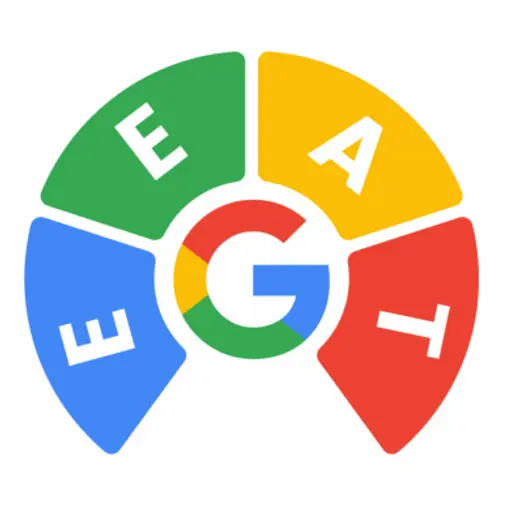
5 Steps to Enhance E-E-A-T for Better SEO Rankings
Published September 20, 2024
This week, we welcome Jason Hennessey, CEO of Hennessey Digital, to the Sitebulb website, who provides his insight into improving E-E-A-T for better rankings.
A key component of Google’s Search Quality Rater Guidelines is E-E-A-T, which stands for Experience, Expertise, Authoritativeness, and Trust. The recent addition of the second E (Experience), is important because it emphasizes just how much weight Google is now putting on the content creator’s credentials and expertise on the topic that they are writing about.
But here’s the kicker—it’s not a direct ranking factor in Google’s search algorithm. It’s actually a guideline that is used by Google’s human quality raters.
Google’s quality raters keep a very close eye on content that’s being uploaded online—and they are continuously scouring through web pages to see if they are worth ranking on top. This means that while E-E-A-T may not be a direct ranking signal, optimizing your content following these guidelines can still help boost your site’s search performance over time.
Contents:
The Importance of E-E-A-T in SEO
Let’s start by breaking down the different components of E-E-A-T:
- Experience (E) rates content based on the author's first-hand experience on the topic.
- Expertise (E) evaluates the content creator’s knowledge and skill in the specific field or subject matter.
- Authoritativeness (A) measures the credibility and influencer of the content creator or the website.
- Trust (T) takes into account the reliability and integrity of both the content and the website.

Using this criteria, Google’s goal is to be able to present the most relevant, reliable, and trusted content. For users, this means they can trust Google to always deliver high-quality search results. For content creators, this means this can help them build their expertise and authority in their niche.
So how does it affect SEO?
In the context of E-E-A-T, Search Quality Rater Guidelines describes Experience this way:
“Consider the extent to which the content creator has the necessary first-hand or life experience for the topic. Many types of pages are trustworthy and achieve their purpose well when created by people with a wealth of experience.
For example, which would you trust: a product review from someone who has personally used the product or a “review” by someone who has not?”
Now, let’s use this article as an example.
I head my own digital marketing company, Hennessy Digital, which specializes in SEO and I’m writing about how we can enhance E-E-A-T to boost SEO rankings. Following Google’s E-E-A-T criteria, this would make me a content creator that you can trust, because my experience and expertise in this area is a big factor in meeting their quality guidelines. This in turn should help this particular article rank higher in searches specific to E-E-A-T, SEO, and improving search rankings.
5 Steps to Enhance E-E-A-T for Improved Rankings
According to Google, trust is the most important component of E-E-A-T. Pages with low trust scores will immediately have low E-E-A-T. It doesn’t matter how experienced the author behind it is, or how much expertise their content creator might have, or even how authoritative the site may seem.
So the question really is how can we build towards that level of trust that Google’s quality raters are looking for? How can we enhance our own E-E-A-T to improve your rankings?
Let’s get into it:
Step 1: Highlight Experience
Google is done with copy-pasted or AI-generated content that doesn’t give the reader any value. It wants a fresh perspective that readers won’t find anywhere else.
Demonstrate Practical Knowledge
Case studies are one of the best ways you can demonstrate expertise through content. However, typically case studies tend to be lengthy and hard to read.
The best way to hook readers in is to use real-world examples, or stories about things you have experienced in your field. Try to position it in a way where you take a different approach, especially when it comes to subject matter that often gets covered. Take this case study from Hubspot where it uses the mistakes she’s made as a hook. It’s relatable (everyone makes mistakes, after all) but it still demonstrates expertise.

The entire article focuses on the author’s personal journey, covering the mistakes and valuable lessons learned in the process. She even uses different examples to help the audience make a decision.

Remember, in E-E-A-T, first-hand experience with the subject matter is important and adding supporting details that underscore exactly what you’ve learned will help emphasize this. Be sure to add first hand experiences from clients if you have them, as well as reviews, testimonials and other material that can substantiate your expertise.
Engage With Multimedia
Sharing images, videos, podcasts, and other visual elements relating to your subject matter can help demonstrate your experience. For instance, look at this detailed review of Jasper AI titled “Honest Review of Jasper AI 2024.” The content, in fact, does justice to the title as the author provides a detailed explanation of how you can use the platform with pictures of her own dashboard.

Appropriate visuals prove you have actually used the product and didn’t simply browse through a couple of top ranked reviews to write your own.
While the most common and easily accessible media are images and videos, don’t sleep on podcasts. It can generate fresh content for your site, attract backlinks, increase time spent on your site, enhance engagement, and drive more organic traffic–which all contribute to raising your site authority.
Podcasts can give you the chance to deliver more in-depth, valuable, entertaining, and informative content to current and potential audiences, providing a unique opportunity to connect on a more personal level compared to traditional advertising channels.
Publish Detailed Content
Don’t just give a brief overview of the subject that you’re writing about. For your experience to be recognized as credible, your content has to reflect that.
Writing comprehensive guides with examples, step-by-step tutorials, and detailed personal analysis can put the spotlight on how well you understand your subject matter.
Zach Dannett, Founder of retail brand Tumble, shared this tip with me:
“Create content that dives deep, offering practical insights and extensive details. For example, as an ecommerce retailer, I often share stories of my entrepreneurial journey online. But beyond just listing the steps, I include personal anecdotes, strategies I implemented, present my early business plans, and include market research results that helped me scale my brand. This helps make my experience more relatable and engaging; and it also shows how they can use my own experience for their current situations.”
Step 2: Establish Expertise
Google’s quality raters pay very close attention to the details—especially when it comes to establishing the content creator’s expertise. In the context of understanding an author’s expertise, there are three things that you have to consider:
1. Highlight Author Credentials
“The author’s bio and the content that they are producing should match. Because of how valuable the author’s credentials are to the E-E-A-T framework, making sure the bio reflects the expertise that the content is claiming is important. It’s a very simple detail that many overlook,” reminds SEOProfy Founder, Victor Karpenko.
Victor often writes about data-driven SEO so he makes sure that his bio and credentials reflect this:

The bio here highlights his background, practical experience, and how all these translated to real accomplishments. When users searching for the topic see they are getting insights from an expert, they are more likely to trust the content. This will increase the time spent on the page, lower bounce rates, and increase engagement—all factors that will positively influence your rankings.
2. Maintain High-Quality Content
You won’t see an increase in traffic and rankings if you follow an erratic posting schedule. If you want to see your targeted keywords making their way to the top, you have to be consistent about publishing well-researched content written by experts.
If your site has high domain authority, start welcoming guest blogs from fellow industry experts. This will help bring fresh and diverse content to your site but also establish your expertise in the field, while growing your site’s authority. When well-known experts contribute content to your site, it boosts your credibility and positions you as a key player in your industry. Their insights and authority can attract their followers to your site as well, expanding your reach and bringing new visitors.
3. Cite Reputable Sources
Work towards turning your website into a hub of authoritative content in your niche. Gather relevant statistics from reliable and credible sources and be sure to cite and link back them. Try repurposing data that you find and presenting them in a new way. Blog posts and images are great, but there are so many other forms of media and content that you can use to engage audiences.
Step 3: Build Authoritativeness
One of the leading signals of high quality content is that it comes from a site with high authority. Nothing beats establishing expertise and credibility organically by focusing on creating and publishing valuable and relevant content. But there are ways that you can give your site a solid boost:
Earn Quality Backlinks
Search engines view backlinks as a vote of confidence, especially when reputable sites link back to your content. It suggests your information is valuable, relevant, and worth reaching the target audience. And let’s not forget the boost in traffic and visibility you get from the linking sites.
But remember that getting backlinks from reputable websites is not easy. Your content must provide unique data, present original research, or offer fresh perspectives that will help them enhance their own content’s credibility while also offering something valuable for their audience. While that can take a lot of time and resources, writing quality content for high-authority domains is a quicker way to generate high-value backlinks.
Guest Blogging
Guest posting in your niche is an excellent way to build a diverse backlink profile and drive traffic to your site. When you contribute valuable content on high-value platforms, it highlights your knowledge and expertise on the subject matter, which highlights your expertise and experience, helps boost your authority, and maintains your visibility.

Showcase Industry Recognition
Showcasing industry recognition can reinforce your authority and credibility. Reminding everyone that your work is recognized by respected industry leaders or platform signals to search engines that you are a trusted expert. This will ultimately reflect on your site’s perceived trustworthiness and expertise, which helps you rank higher on search engine rankings.

Step 4: Promote Trustworthiness
Google puts trust at the center of the E-E-A-T framework. This shows the importance of making your content trustworthy by keeping it accurate, honest, safe, and reliable.

Implement Transparent Practices
Transparency is important in SEO and E-E-A-T. Clearly communicating your business practices, privacy policies, and data handling procedures can build trust with your audience and search engines.
While they may seem like innocuous rules and standards that sites must adhere to, this kind of information reassures customers that their information is handled securely and ethically, which enhances your site's trustworthiness. This openness signals to search engines that your site is credible and reliable, and this can in turn help boost your search rankings.
Display User Reviews and Testimonials
Place genuine user testimonials in a way that catches instant attention. Don’t bury it all the way down or deep in your websites. Highlight the best ones on your homepage and add them in your product or service pages.
Here’s one example from Tumble that highlights user reviews as well as expert, high-value testimonials.

Ensure Website Security
On a more technical note, remember that a secure site matters as well. A secure site that is able to protect user data is key here. Basics like HTTPS is a key consideration for search engine rankings because it will provide a safe user experience.
Step 5: Optimize for User Experience
Do not underestimate how frustrating it is for users to navigate websites that are not user friendly. When websites aren’t built to deliver a great user experience, when navigation is confusing, or if a site isn’t built to be mobile-friendly, quality raters consider these as low quality websites.
Mobile-Friendly Design
Sometimes, we come across fully functional websites on desktop, but the layout gets messed up when you switch to your phone. You find overlapping elements, you’re unable to figure out navigation, and the speed gets affected.
The shocking part is even platforms with millions of users sometimes don’t make the effort to optimize for mobile devices. Take LastPass, for example, which failed to adapt the website interface for the mobile version.

The popular password storage app failed to optimize for mobile and it squeezed vital account settings in a little smartphone screen; basically ending up showing only 40% of the website.
Not only does it make using the site difficult, considering that you’re supposed to entrust your passwords to this site, it reflects the technical capabilities of the site. Are they able to really protect our data when they can’t even do the bare minimum of optimizing for mobile use?
Improve Loading Times
Loading speed matters a lot when it comes to user experience. The average web page load time is 2.5 seconds on desktop and 8.6 seconds on mobile—anything longer is likely to make users feel impatient and will, more than likely, lead to them bouncing.
A website must therefore load as fast as possible to ensure you don’t lose visitors due to slow loading speeds.

Create Engaging and Accessible Content
Once you tick all these technical boxes, we go back to the reason that users are on your website in the first place: engaging, accessible content. But this goes beyond just making sure you’re presenting good quality material, you want to make sure it’s accessible to all users, including those with disabilities.
There are different ways that you can make sure your content is accessible to everyone. If you have videos, make sure you add subtitles. For podcasts, be sure to include show transcripts. Use Accessible Rich Internet Applications (ARIA) landmarks and roles to define page structure, making it easier for screen readers to interpret the content. And design your forms so that they are easy to navigate and understand, with clear labels and instructions. Ensure that form fields are accessible via keyboard and screen readers.
These efforts will help you retain your visitors on your web pages for longer, reduce bounce rates, and demonstrate to quality raters that your content is valuable and worth ranking higher in SERPs.
Conclusion
Google's algorithms demand more than just basic content; they prioritize unique, expert-driven material that puts the spotlight on your personal experience and knowledge. Equally important is building a strong reputation through quality backlinks from authoritative sites. But it’s very important to remember that at the center of this all is trust.
Like most things, trust is something that you have to build—and consistently improving the different elements discussed in this article helps you work towards that.
Start implementing these steps today to see a positive impact on your SEO rankings and audience engagement.
You might also like:

Jason Hennessey is a renowned entrepreneur, internationally-recognized SEO expert, and business coach with a career starting in 2001. He has extensively studied and mastered Google's algorithm, leading to the successful growth and sale of multiple ventures, including a prominent digital marketing firm specializing in the legal sector. Since 2015, as CEO of Hennessey Digital, he has overseen its rise to a multi-million dollar enterprise featured twice on the Inc. 5000 list. Jason is also a prolific speaker and educator, sharing his SEO wisdom through keynotes, his podcast, and his educational platform iloveseo.com.
Articles for every stage in your SEO journey. Jump on board.
Related Articles
 Beyond Cosine Similarity: Testing Advanced Algorithms for SEO Content Analysis
Beyond Cosine Similarity: Testing Advanced Algorithms for SEO Content Analysis
 How to Stay Relevant in a World of AI Overviews & Query-Fans
How to Stay Relevant in a World of AI Overviews & Query-Fans
 Content Refresh Guide: How to Improve Your Search & AI Visibility
Content Refresh Guide: How to Improve Your Search & AI Visibility
 Sitebulb Desktop
Sitebulb Desktop
Find, fix and communicate technical issues with easy visuals, in-depth insights, & prioritized recommendations across 300+ SEO issues.
- Ideal for SEO professionals, consultants & marketing agencies.
Try our fully featured 14 day trial. No credit card required.
Try Sitebulb for free Sitebulb Cloud
Sitebulb Cloud
Get all the capability of Sitebulb Desktop, accessible via your web browser. Crawl at scale without project, crawl credit, or machine limits.
- Perfect for collaboration, remote teams & extreme scale.
If you’re using another cloud crawler, you will definitely save money with Sitebulb.
Explore Sitebulb Cloud
 Jason Hennessey
Jason Hennessey



